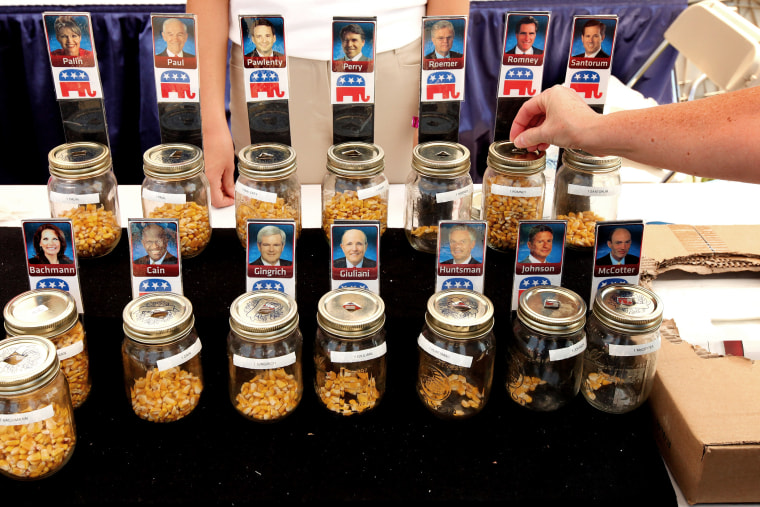The first sign of trouble came exactly one month ago today. Former Gov. Jeb Bush (R) said he'd gladly compete in the Iowa caucuses, but he wouldn't participate in the quadrennial Iowa Straw Poll. A week later, Mike Huckabee, a strong contender in Iowa, made the same announcement.
The list grew quickly. Lindsey Graham said he'd skip the event, as did Marco Rubio. Rick Santorum said he's willing to participate in the straw poll, but he wouldn't spend a penny on it.
The Republican Party of Iowa's governing board has known for quite some time that candidates, campaigns, and even many political journalists have come to see the Iowa Straw Poll as a pointless waste, but they voted unanimously in January to keep the event going and scheduled it for Aug. 8.
Six months later, however, state GOP officials couldn't deny the writing on the wall. The Des Moines Register reported this morning, "The Iowa Straw Poll is dead."
The governing board for the Republican Party of Iowa voted unanimously Friday to cancel the straw poll, a milestone on the path to the White House that had passed the strategic tipping point. It was no longer a political risk for presidential campaigns to walk away from the straw poll, and too many of the 2016 contenders had opted to skip it for it to survive. [...] In recent weeks, party officials had concluded that the much-criticized party fundraiser could potentially damage Iowa's first-in-the-nation caucuses.
By most measures, this was the right call. The original idea of the Iowa Straw Poll was to showcase Republican presidential campaigns in the state, but in recent cycles, the gathering became rather ridiculous -- it was a fundraiser for the state party, which candidates paid handsomely to participate in for reasons no one could explain.
But there is an important flip side to all of this.
In recent election cycles, the Iowa Straw Poll served as something of a status check for campaigns -- if they made a real effort to compete in the contest, but failed to bring supporters out in the numbers they hoped for, the results would cause candidates to reevaluate the strength of their candidacies.
In 2012, we saw a classic example. Minnesota's Tim Pawlenty (R) was struggling to break through anyway, but after a poor showing in the Iowa Straw Poll, the former governor decided to call it quits.
With this in mind, the event could have played a useful role this year. Republicans are struggling to deal with the largest presidential primary field of any party in American history, and a major event -- positioned midway between kickoffs and voting -- could have helped theoretically winnow the field a bit.
But as nearly everyone soured on the Iowa Straw Poll, it lost its opportunity to play that role. And now, it is no more.
Postscript: Let the history books show that the winner of the final Iowa Straw Poll was Michele Bachmann in 2011, which seems a fitting end to an awkward exercise.
